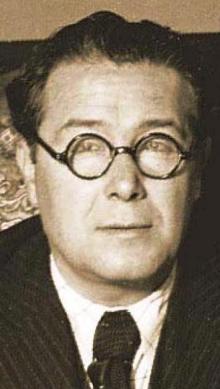Rafael Vidiella facts for kids
Quick facts for kids
Rafael Vidiella Franch
|
|
|---|---|
 |
|
| Born | 1890 Tortosa, Spain
|
| Died | 1982 Barcelona, Spain
|
| Nationality | Spanish |
| Occupation | Typographer, politician |
Rafael Vidiella Franch (born in 1890, died in 1982) was an important figure in Spanish politics. He was a trade unionist, which means he helped workers get fair treatment. He was also a communist politician from Catalonia, a region in Spain. During the Spanish Civil War (1936–1939), he worked as a minister in the government of Catalonia.
Contents
Rafael's Early Life and Work
Rafael Vidiella Franch was born in Tortosa, Spain, in 1890. He became a typographer, a person who designs and arranges printed material.
As a young man, Rafael joined a group called the Confederación Nacional de Trabajadores (CNT). This group was focused on helping workers. From 1923 to 1930, during a time when Spain was ruled by Miguel Primo de Rivera, Rafael edited a newspaper called Solidaridad Obrera (Worker's Solidarity) in Valencia.
Later, he left the CNT and joined another important workers' group, the Unión General de Trabajadores (UGT). From 1931, Rafael led the Catalan branch of the Partido Socialista Obrero Español (PSOE), a socialist political party.
Forming a New Political Party
In 1935, different left-wing political groups in Catalonia started talking about joining together. Some groups, like the Bloque Obrero y Campesino and the Izquierda Comunista, merged in October 1935 to create the Partido Obrero de Unificación Marxista (POUM).
Rafael Vidiella and other leaders worked hard to create a new, unified party. There were some disagreements about which international group the new party should join. Rafael wanted it to join the Labour and Socialist International. Eventually, they agreed, and the new party was formed.
In May 1936, Rafael left the national committee of the PSOE. A few months later, he and another leader, Joan Comorera, became members of the main committee of the Partido Comunista Español (PCE).
The new party they helped create was called the Partit Socialista Unificat de Catalunya (PSUC), or Unified Socialist Party of Catalonia. At first, it had only a few thousand members. But by March 1937, it grew very quickly to about 50,000 members!
Rafael's Role in the Spanish Civil War
The Spanish Civil War began in July 1936. The government of Catalonia, called the Generalitat, quickly set up a special committee to fight against the military uprising. Rafael Vidiella was put in charge of an important investigation group within this committee.
Serving as a Minister
On July 31, 1936, the President of Catalonia, Lluís Companys, formed a new government. Rafael's party, the PSUC, was given three important roles, called ministries.
- Joan Comorera became the Minister of the Economy.
- Rafael Vidiella became the Minister of Communications.
- Estanislau Ruiz Ponsetti became the Minister of Supplies.
The government wanted to handle events from the early days of the war carefully. Rafael prepared a statement saying that the courts should not treat "revolutionary events" as crimes. Even though President Companys was unsure, Rafael went ahead and published the statement in newspapers.
Later, on December 17, 1936, a new government was formed in Catalonia. Rafael Vidiella became the Minister of Justice. He also served as the Minister of Labor and Public Works starting in April 1937.
Important Events and Changes
In May 1937, there were some serious clashes in Barcelona between different groups fighting against the military uprising. After these events, the government changed again. Rafael Vidiella was appointed Minister of Public Order, Justice, and Labor.
On June 28, 1937, President Companys formed another new government. Rafael became the Minister of Labor and Public Works again. He kept this job for the rest of the civil war. In September 1937, Rafael stated that judges should not prosecute actions related to the revolution, as that would be like prosecuting the revolution itself.
Life After the War
After the Spanish Civil War ended in 1939, Rafael Vidiella had to leave Spain. He lived in different countries before settling in Budapest, the capital of Hungary.
For several years, he was a leader in the Partido Comunista de España (PCE). He also wrote for a magazine called Nous Horitzons, which started in 1960.
In 1976, Rafael Vidiella returned to Spain and lived in Barcelona. He passed away there on September 23, 1982.
See also
 In Spanish: Rafael Vidiella para niños
In Spanish: Rafael Vidiella para niños
 | John T. Biggers |
 | Thomas Blackshear |
 | Mark Bradford |
 | Beverly Buchanan |

